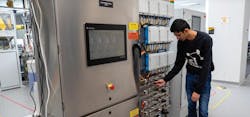Rockwell Automation and Cisco partner on New Manufacturing Training Program
Automation is often viewed as a means of helping manufacturers cope with both domestic labor shortages and higher costs without losing their competitive edge. However, while the integration of automated technologies has eliminated some need for unskilled labor, it has created an increased need for skilled labor.
Remedying this situation isn’t merely a task for manufacturers themselves. Doing so is also in the best interest of technology suppliers, as adoption of their products often hinges on whether end users have access to a skilled workforce capable of working in a highly automated environment.
These mutual interests have led to an uptick in partnerships between academic institutions and private industry in recent years. By donating equipment to colleges and universities, technology suppliers can accomplish two goals. First, they help expand the workforce available for domestic manufacturers, which may further incentivize reshoring. In addition, because those workers will have already been trained on vendor-specific equipment, manufacturers looking to invest in new automation products may be more likely to choose those particular providers.
The University of Wisconsin’s Connected Systems Institute (CSI) is just one example of a collaboration between academia and industry designed in this mold. CSI is located in Milwaukee, Wis., which is home to six Fortune 1000 manufacturers, making it one of the most prominent manufacturing hubs in the U.S. Maintaining this industrial legacy, however, will require a substantial increase in skilled workers. Analytics firm Burning Glass Technologies estimates a 63% projected growth in need for manufacturing employees with cybersecurity skills and a 34% projected growth for those with data analytics and visualization skills.
“We have all of these technologies that industry is just dying to apply,” said Joseph Zaccaria, manager for global academics at Rockwell Automation, “The only problem is that there’s a lack of talent.”
Both Rockwell Automation and Cisco donated equipment, software, and subject matter expertise to the University of Wisconsin to form CSI, which occupies 11,000 square feet on the University of Wisconsin-Milwaukee campus. Available resources and facilities include a manufacturing test bed that mimics a fully functional production environment, a digital twin lab, and an operations technology (OT) cybersecurity lab.
The goal of CSI is two-fold. First, it aims to nurture a next-generation workforce that will provide manufacturers with access to potential employees trained in a combination of the IT and OT technologies necessary to operate a modern manufacturing plant. Second, it provides a pilot environment where Rockwell Automation and Cisco can collect new knowledge about work processes to further their own research and development efforts. Regarding this latter pursuit, the companies intend to focus on innovations pertaining to digital twins, data and sensor networks, data analytics, machine learning integration, OT cybersecurity, and enterprise resource planning integration.
About the Author
David Miller
Former Senior Technical Writer

Leaders relevant to this article:
